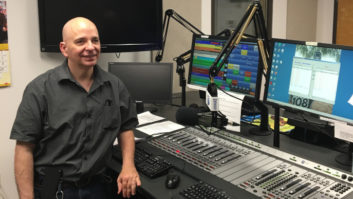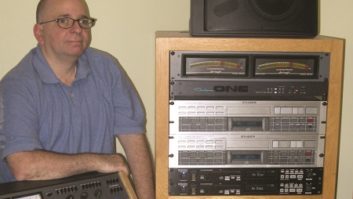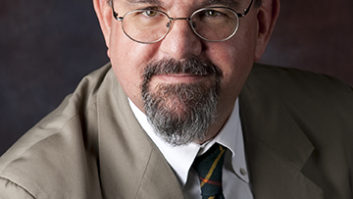WASHINGTON NPR doesn’t see an improvement in the problem of over-powered wireless FM modulators interfering with the signals of terrestrial stations. In fact, the network believes the issue is becoming worse and has fortified its efforts to persuade the FCC to take steps to remove non-compliant devices from the market, whether that involves a product recall or other action.
NPR also has called into question how all wireless FM modulators — for satellite radio, iPods or MP3 players for example — are certified and believes the commission should review that process. NPR has urged the agency to freeze certifications for Part 15 devices for companies that knowingly make or sell overpowered devices.
In a letter to FCC Chairman Kevin Martin, NPR CEO Ken Stern said public radio stations nationwide are receiving complaints from listeners about interference from these devices, in what he characterized as an “unchecked, growing problem.”
The complaints are especially prevalent for stations in areas where the most common default for the modulators is 88.1 MHz.
‘Objectionable interference’
In a spot check of consumer electronic advisements in a November issue of the Washington Post, Radio World found that several stores, including Best Buy and Target, displayed a photo of the same Apple iPod Nano, showing it 88.1 MHz displayed on the wireless FM modulator.
Stern wrote, “Unlawful modulators pose a substantial risk of objectionable interference and have contributed to a corresponding, unacceptable degradation of the audio quality of public radio stations.”
Referring to a study of wireless FM modulators conducted by NPR Labs this summer, Stern described the findings as alarming. NPR said the study showed more than 30 percent of observed devices tuned to two frequencies on three commuter routes in the Washington area were operating above Part 15 power limits.
About NPR’s specific request and the overpowered FM modulator issue in general, FCC spokesman Clyde Ensslin would only say, “This matter is under review.”
Consumer Electronics Association spokeswoman Meghan Henning said the organization, which represents companies that make and sell the devices, made members aware of the issue when NAB released a study of the devices this summer. “XM and Sirius had their FM modulators redesigned and re-certified,” by the FCC, she said.
Since then, CEA has been working with the agency on the issue, she said.
CEA would support a “rational and reasonable approach of ensuring compliance on an ongoing basis rather than recalling products already in the retail chain,” Henning said. It would oppose a recall, she said, adding that a published account in the Baltimore Sun reporting the opposite was inaccurate.
Contacted for comment, a Sirius spokesman said the company has said all it intends to say about the issue in its public filings.
It was in such a public filing to the SEC earlier this year that the satcaster said, and RW reported, that two employees knowingly had manufacturers built over-powered devices.
The proposed moratorium on Part 15 certifications or re-certifications to which Stern referred in his letter cited “any organization that has knowingly participated in the commissioning, manufacture, sale or distribution of over-powered, noncompliant FM modulators, whether intended for use with satellite radios, flashplayers or standalone devices.”
Unused frequencies
NPR Vice President and Chief Technology Officer Mike Starling, who is also executive director of NPR Labs, said that portion of the letter was not aimed specifically at Sirius.
Indeed, he said Sirius designed an update to the certification program for installers of mobile CE devices that lays out the steps to take to find unused frequencies in a market.
He and other broadcast and consumer electronics engineers commenting for this story said the ultimate solution is for manufacturers to move away from plug-in wireless devices to wired products.
XM seems to be moving in this direction with its new SureConnect plug-and-play tuners, designed for self-installation and due to arrive on store shelves this month. They are the Audiovox Xpress, DelphiRoadyXT, XM Sportscaster and SkyFi3.
The SureConnect car kit sends the FM signal over a wire that clamps onto the car’s mast antenna or onto a car’s in-glass antenna.
XM President/COO Nate Davis, in response to a question from an analyst about the FM modulator issue during a recent financial conference call, said that XM believes professional installation “is the better way to go” with “less chance of a problem,” but that SureConnect gives the consumer a quality approach to installation.
One consumer electronics source indicated that car companies are planning to provide more ways to get audio devices into in-dash radios, providing an “aux” port in the back of the head unit and a stereo jack in the front, eliminating the need to plug a device into the cigarette lighter. The recent announcement by several U.S. automakers about providing ways to connect iPods to the car’s audio system is another move in that direction, experts believe.
While both XM and Sirius addressed the issue of overpowered FM modulators with re-designs, the fixes don’t affect their older devices and those made by other manufacturers and purchased by consumers.
Consumer electronics sources said a recall would be disruptive to consumers and expensive for manufacturers. It would be relatively easy to track modulators for satellite radio, said one source, because those devices have registration numbers on the box. The story is different for other FM modulators. A retail chain may have information on only a small percentage of the consumers who purchased the device, and only if the buyers chose to register that purchase with the company.
Replacing stock before it hits the store shelf is much less expensive than getting consumers to send hardware back to a manufacturer and have it replaced, CE sources agreed.
Rigor
The overpowered FM modulator issue goes beyond satellite radio to iPods and MP3 players, “raising the specter of a more widespread problem,” said Mike Riksen, NPR’s vice president of government relations. NPR believes this “raises fundamental issues concerning the trustworthiness and rigor applied to type-certification submissions,” Stern wrote in the letter.
To receive FCC certification, manufacturers must send information to the commission that shows their devices meet certification standards. Companies can conduct tests themselves or have the tests conducted by third-party labs.
Manufacturers like the current certification procedure because it removes the process from a development cycle and doesn’t delay products in reaching market, said one consumer electronics source said.
However, if companies don’t act in good faith, “those instances should be rooted out and pursued,” Riksen said. Regardless of whether companies that are violating the Part 15 emission limits are lying or ignorant of the rules when they submit test information for certification, he said, “some don’t know or don’t care. That’s unacceptable.”
The penalties for selling overpowered devices range from a recall to a fine of $11,000 per violation or per day with a cap of $97,500.
NPR executives said they would follow up with the FCC after sending the letter and were still discussing their next steps internally.






